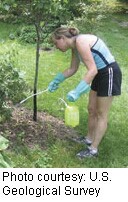Family Study Associates Pesticide Use With Parkinson's Risk
Study found strongest ties to herbicides and insecticides.
|
E-mail this article
Subscribe to news
Printer friendly version
|

(SOURCE: BioMed Central, news release, March 27, 2008)
FRIDAY, March 28 (HealthDay News) -- Parkinson's disease has been linked to exposure to pesticides in a new study comparing people with the neurological disorder and their unaffected relatives.
The study, published online in the open-access journal BMC Neurology, found the strongest ties to the use of herbicides and insecticides, such as organochlorides and organophosphates. Drinking well water or living or working on a farm, two common experiences for pesticide exposures, did not appear to be associated with Parkinson's.
Many Parkinson's disease cases are thought to be due to an interaction between genetic and environmental factors. By studying related individuals who share environmental and genetic backgrounds, researchers said they could identify specific differences in exposures between individuals with and without the disease.
"Previous studies have shown that individuals with Parkinson's disease are over twice as likely to report being exposed to pesticides as unaffected individuals, but few studies have looked at this association in people from the same family or have assessed associations between specific classes of pesticides and Parkinson's disease," study author Dana Hancock said in a prepared statement.
Researchers from both Duke University Medical Center and the University of Miami Miller School of Medicine interviewed 319 Parkinson's patients and more than 200 of their relatives to get details about whether they ever were exposed to pesticides, lived or worked on a farm, or drank water from wells.
Parkinson's disease, which affects about 1 million people in the United States, is characterized by symptoms such as tremors and muscle rigidity. Several gene variations have been tagged as contributing to the disease, but these rare defects account for a small proportion of those affected by disorder.
While several other studies have supported pesticides as a risk factor for Parkinson's, "biological evidence is presently insufficient to conclude that pesticide exposure causes PD," Hancock said.
"Further investigation of these specific pesticides and others may lead to identification of pertinent biological pathways influencing PD development," he said.
More information
The U.S. Environmental Protection Agency has more about pesticide safety.
Copyright © 2008 ScoutNews, LLC. All rights reserved. 
HealthDayNews articles are derived from various sources and do not reflect federal policy. healthfinder.gov does not endorse opinions, products, or services that may appear in news stories. For more information on health topics in the news, visit the healthfinder.gov health library.